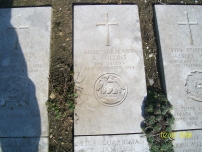| First Name: | Alfred Charles | Last Name: | COLLINS | |
|---|---|---|---|---|
| Date of Death: | 03/11/1914 | Lived/Born In: | Peckham | |
| Rank: | Sergeant | Unit: | Royal West Surrey (Queens)2 | |
| Memorial Site: | ||||
Current Information:Born-Maidstone Enlisted-London Wimereux Communal Cemetery, France
First Battle of Ypres Between 21st October and 22nd November, 1914 a desperate fight took place around the Belgium city of Ypres, the first of three major battles that were to be fought there during the course of the war. British troops entered Ypres in October. The 1st and 2nd Divisions plus the 3rd Cavalry Division had made their way up from the Aisne as part of the “Race to the Sea”, whilst the 7th Division came west to Ypres after Antwerp had fallen. The Germans knew that Ypres was the gateway to the Channel ports and that these were vital to Britain’s war effort so they poured reinforcements into the area. The fighting fell into three distinct battles; the Battle of Langemarck, 21-24 October, the Battle of Gheluvelt, 29-31 October and the Battle of Nonne Bosschen, 11 November. Ypres did not fall to the Germans but its defence during these two months resulted in the destruction of much of the old regular British Army. Between 29th and 31st October a massive concentration of German troops tried to break the British line around Gheluvelt at the eastern apex of the Ypres salient. 1st and 7th Divisions stood in their path. On the 29th October, after a day of intense fighting, often hand to hand, the British were pushed back to the Gheluvelt cross roads. The following day the Germans attacked Gheluvelt itself and although the village remained in British hands, German troops had some success further south at Zandvoorde and were now able to enfilade the British line. Then on 31st October came the main German attack and Gheluvelt fell. At one stage the it seemed that all was lost but a dramatic counter attack by 2nd Worcestershire, stabilised the line. However, the loss to the British army had been enormous. At 5.30 am on 29th October and concealed by fog, the expected Germans attack began. It fell on the Gheluvelt cross roads, where the Menin Road crossed between Kruiseecke and Poezelhoek. 7th Division were south of the Menin road with 1st Grenadier Guards and 2nd Gordon Highlanders in the line They came under severe pressure and were forced back. The 2nd Royal West Surrey (Queens) battalion of 22 Brigade were in Divisional reserve and were sent to regain the ground lost by 1st Grenadier Guards. They started the day by moving to Veldhoek and then on to reinforce the Guards at Gheluvelt. Although the lost ground was not regained, 2nd Queens and other units did manage to stabilise the line. The Germans attacked Gheluvelt again the next day, 30th October when an advance party of 2nd Queens was heavily attacked and responded in kind. They also had to contend with continuous shell fire but the line held. The following morning, 31st October, the Germans attacked in even greater force and 2nd Queens were shelled out of their trenches and back into the woods. There was heavy fighting all day. The British line held until night when what was left of the battalion retired to the Chateau and dug in. Due to heavy losses, 22 Brigade was formed into two battalions, No 1 being made up by remnants of 2nd Queens and 1st Royal Welsh Fusiliers and held a line from the Chateau east of Zandvvorde to the Menin Road until they were relieved during the night of 4th November. Alfred Collins died from wounds on 3rd November, 1917, after having been sent to a base hospital on the coast, but the exact date on which he was wounded is not known. |
||||
| « Back to Search Results | ||||
| If you think any of the information shown here is incorrect, Click Here to submit your amends and comments | ||||




